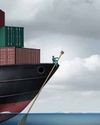After an overwhelming participation in 2016, the mega logistic summit taking the mettle forward came back to the cosmopolitan city of Bengaluru this year in the form of “Smart Logistics Summit & Awards 2017” in a more grandeur avatar.

Decades ago, precisely the year was 1983 when a group of youngsters embarked on a journey to put Bengaluru on the global IT map. Then a tier-II city known for its soulful music, an abode for retired public sector employees, home to some of the finest boarding schools in the country, gardens and blanket of green pastures, lakes et al., and a handful of public sector enterprises including prominent ones like BHEL and ISRO. Over a period of time the city as well as the state of Karnataka has also carved a niche for itself in the global trade scene for its merchandise trade as well. No wonder exports from Karnataka has been on the rise, and total exports from the state is about US$ 52 billion which contributes to about 13 per cent of India’s exports to the world. Compared to the state’s contribution to country’s EXIM economy, a lot more is desirable on the infrastructure front. The state’s sole ICD at Whitefield is now engulfed by the ever expanding unregulated city limits. The moment one sets onto the chock-a-block motorways connecting the airport to the city there is a realisation of the stark contrast that a place has on offer which is known for providing the finest technology solutions to the world. The state’s EXIM based economy had a dream run so far, but to sustain the momentum there is a dire need not only to provide logistics but to make logistics ‘SMART’. With the motto get ready for the future, Gateway Media had launched the first edition of Karnataka Logistics Summit in 2016 at the state capital, and taking the mettle forward it came back to the cosmopolitan city of Bengaluru in 2017 in the form of “Smart Logistics Summit & Awards 2017”.
この記事は Maritime Gateway の December 2017 版に掲載されています。
7 日間の Magzter GOLD 無料トライアルを開始して、何千もの厳選されたプレミアム ストーリー、9,000 以上の雑誌や新聞にアクセスしてください。
すでに購読者です ? サインイン
この記事は Maritime Gateway の December 2017 版に掲載されています。
7 日間の Magzter GOLD 無料トライアルを開始して、何千もの厳選されたプレミアム ストーリー、9,000 以上の雑誌や新聞にアクセスしてください。
すでに購読者です? サインイン

Impact Of Covid-19 On Shipping And Logistics
Industry stalwarts discuss threadbare the prevailing logistics and supply chain scenario and issues in clearing cargo during the COVID-19 lockdown

Digital Platforms Defy Lockdown
Digital trading modules such as eNAM are enabling farmers to move their produce from farm to market even during the lockdown

GARMENT TRADE TRAMPLED
As retailers face a shutdown in US and Europe, the cascading affect has caused mass cancellation of orders in Bangladesh

TRADE RESUMES WITH CHINA
While India has allowed uninterrupted movement of imports into Nepal even during lockdown, China is reopening its borders as it emerges from the pandemic
LESS HUMAN INTENSIVE, MORE DATA DRIVEN
AI provides transformational opportunity for logistics industry by improving customer experience, operational efficiency, faster turnaround time and lower cost while ensuring security and transparency. Macro environment requires industry to transform to be less human intensive, agile and data driven, all of which can be accelerated by AI adoption, shares Gangadhar Gude, Founder & CEO, atai.ai

SHAKEN AND STIRRED
The COVID-19 pandemic has partially paralysed the logistics and supply chain, but the industry is still deterred to ensure supply of essentials continues

TRADE STUCK, ECONOMY SLOWS DOWN
Sri Lankan economy slows down as trade deficit widens and supply chain disrupts amidst lockdown

LENDING INTELLIGENCE TO SUPPLY CHAIN
If you’re shipping millions of dollars’ worth of pharmaceuticals, high-end electronics, expensive seafood, or precious metals, what would you be willing to pay for the ability to ‘ask’ your shipment where it is right now and whether it’s ok? What would you pay for a freight smart enough to raise an alarm before it spoils? Artificial Intelligence enables that and much more…

CONTAINER LINES SIGNAL ‘SOS'
As the per-unit cost of operations increases many lines are forced to blank sailings which has hit their bottom line real hard. The Government and Terminal Operators therefore need to actively consider reduction in Vessel Related Costs

IMO 2020 And The Covid-19 Curse
The COVID-19 outbreak has shaken and stirred the already volatile bunker market. While the refiners adjust their capacities and shipping lines choose their path to compliance, the market dynamics are yet to reach an equilibrium